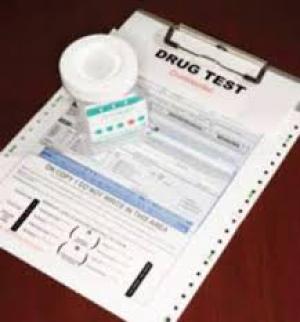A half-dozen states could see marijuana legalization or medical marijuana initiatives on the ballot this year.
Mom-and-pop legal marijuana farmers trying to grow in the most Earth-friendly fashion face many obstacles, but they keep on keepin' on.
Lawmakers in the Granite State are dealing with a bevy of medical marijuana bills, a North Carolina Native American tribe opens the state's first dispensary, and more.
A meth-slinging Pennsylvania police chief gets ready to head to prison and so does a former NYPD officer who used her desk duties to cook up dope deals.
A political battle is looming in Brazil over drug decriminalization, New York's attorney general is investigating a hospital for drug testing pregnant patients without their consent, and more.
There was some torture-style nastiness over failed drug tests in a Kentucky prison, Kentucky lawmakers act to expedite medical marijuana licensing, and more.
The UN says Colombian coca cultivation is at an all-time high, North Carolina lawmakers move to ban "gas station heroin," and more.
That National Conference of State Legislatures reiterates its support for banking access for pot businesses, Sen. Jacky Rosen (D-NV) files a marijuana expungement bill, and more.
Granite State lawmakers ponder a bevy of medical marijuana bills, a Data for Progress poll has two-thirds supporting marijuana legalization, and more.
Pot fans gathered in Berlin and San Francisco to mark 4/20, the Colorado Senate has approved a social media bill that could ban praise of illicit drugs, and more.
Maine's governor signs a bill to seal the records of past marijuana offenses, a North Carolina tribe opens the first medical marijuana dispensary in the state, and more.
The Kansas governor signs a civil asset forfeiture reform bill into law, a South Carolina medical marijuana bill that has languished for months finally gets some attention, and more.
A half-dozen states could see marijuana legalization or medical marijuana initiatives on the ballot this year.
A decade after Colorado and Washington became the first states to legalize marijuana, legalization has now spread to 24 states and the District of Columbia. Medical marijuana, where California led the way in 1996, is now available in all but 13 states.
This year, Ohio became the latest state to end pot prohibition, but hopes that Hawaii would join it wilted this month, and legislative legalization efforts in New Hampshire and Pennsylvania have yet to bear fruit.
Likewise, legislative efforts to achieve the legalization of medical marijuana in those recalcitrant states yet to embrace it have yet to bear fruit this year. North Carolina may be the best bet this year, but it hasn't happened yet.
That means any further progress on state-level legalization and medical marijuana campaigns will most likely be coming directly from voters in states with the initiative and referendum process. There are three states where voters could say "legalize it" this year -- Florida, North Dakota, and South Dakota -- and two where campaigns to legalize medical marijuana are aiming at the November ballot -- Idaho and Nebraska -- and then there is Arkansas, of which see more below.
Here is what we're looking at:
Marijuana Legalization Initiatives
Florida
The Adult Personal Use of Marijuana constitutional amendment has passed all hurdles, from signature-gathering to a state Supreme Court review, and will be on the November ballot.
The amendment would allow people 21 and over older "to possess, purchase, or use marijuana products and marijuana accessories for non-medical personal consumption by smoking, ingestion, or otherwise," and it would permit medical marijuana treatment centers and other state licensed entities "to acquire, cultivate, process, manufacture, sell, and distribute such products and accessories."
It sets a personal possession limit of three ounces and five grams of concentrates but has no provision for home cultivation or expungement.
It is sponsored by Smart and Safe Florida and bankrolled to the tune of $40 million by medical marijuana operator Trulieve, which stands to benefit immensely from being able to turn its existing "Medical Marijuana Treatment Centers" into adult-use cash cows with legalization. The legislature would have the option of opening up retail sales to other licensees later.
Under Florida state law, the amendment will need to pass with 60 percent of the vote to become law. That could be tough to do. Of two recent polls, one had it with only 47 percent support (although 18 percent were undecided) and the other had it with 56 percent, a majority but not a big enough majority to win.
North Dakota
Maybe the third time will be the charm. State voters defeated previous marijuana legalization initiatives in 2018 and 2022, but this year, a political committee called New Economic Frontier has produced its own marijuana legalization initiative.
It has been submitted to Secretary of State Michael Howe (R), who should draft a petition title clearing the way for signature-gathering any day now. Once it is approved for signature-gathering, campaigners will have until July 8 to come up with 16,000 valid voter signatures to qualify for the November ballot.
The proposed initiative would legalize the possession of up to an ounce of marijuana and four grams of concentrates by people 21 and over. It would also allow for the home cultivation of up to three plants, with a limit of six plants per household.
It would also mandate that the state establish a system of regulated marijuana commerce by October 1, 2025, but that commerce would be limited to seven growers and 18 dispensaries. To avoid excessive concentration, people or businesses may not operate more than one grow, four dispensaries, or one dispensary within a 20-mile radius of another.
There is no recent polling on marijuana legalization in the state. But if the initiative qualifies for the ballot, it will have to do at least five points better than its failed 2022 predecessor did.
South Dakota
The third time could be the charm in South Dakota, too. Voters approved marijuana legalization in 2020, only to see it overturned by the state Supreme Court at the behest of Gov. Kristi Noem (R), then narrowly rejected a second effort amidst lower turnout in the off-year election of 2022.
Now, thanks to South Dakotans for Better Marijuana Laws, voters could have a third shot at getting it right. Their marijuana legalization initiative has been approved for signature-gathering and a petition drive is currently underway. Campaigners need to come up with 17,509 valid voter signatures by May 7 to qualify for the November ballot.
The initiative would legalize the possession of up to two ounces of marijuana or 16 grams of hash or cannabis extracts. It also allows for the home cultivation of up to six plants. It does not establish a system of regulated legal marijuana commerce. That would presumably be up to the state legislature.
Whether South Dakotans will embrace limited legalization is an open question. A South Dakota State University poll this month had support at 49 percent, with 41 opposed and 10 percent undecided. The rule of thumb for initiative campaigns is that they want to have a 10-point lead going into the final weeks. This initiative isn't quite there yet, but it is within striking distance.
Medical Marijuana
Arkansas
The state already has a voter-approved medical marijuana program, but the Arkansas Medical Marijuana Amendment of 2024 would relax regulations, such as allowing medical professionals other than doctors to make recommendations and allowing patients to grow their own medicine. It would also allow the use of medical marijuana for any debilitating medical conditions instead of limiting it to the existing list of qualifying conditions.
But the amendment also intriguingly creates a trigger law that would allow medical marijuana dispensaries to sell recreational marijuana if it becomes federally legal.
The committees behind the measure, Arkansans for Patient Access and the Arkansas Cannabis Industry Association, are in the midst of signature-gathering and have until July 5 to come up with 72,563 valid voter signatures to qualify for the November ballot.
State voters defeated a legalization initiative in 2022. There is no polling on this initiative yet.
Idaho
Among the reddest of red states, Idaho has some of the strictest marijuana laws on the books, but the campaign committee Kind Idaho is working hard to change that. It is currently collecting signatures for its Idaho Medical Marijuana Initiative.
Under that measure, people who have "chronic diseases or conditions or who are terminally ill" and their caregivers would be allowed to possess up to four ounces of marijuana and grow up to six plants. A number of conditions are specified in the text, and the text contains a provision allowing the state to include more conditions.
The initiative also envisions a system of regulated medical marijuana producers and dispensaries.
To qualify for the November ballot, campaigners must come up with 62,896 valid voter signatures by May 1. There are no recent polls on the issue, but a 2022 poll had support for medical marijuana at 68 percent in the state.
Nebraska
Long-thwarted Cornhuskers are set to try again this year to get medical marijuana approved by the voters since it has gotten nowhere for years in the conservative state legislature. The ballot committee Nebraskans for Medical Marijuana is leading a two-pronged initiative campaign designed to achieve medical marijuana legalization while avoiding legal hurdles that successfully blocked earlier efforts.
The first measure, the Patient Protection Act initiative would simply protect those "with serious health conditions and their caregivers from arrest for the use of medical cannabis as recommended by a health care provider. The second measure, the Medical Cannabis Regulation Act initiative, would deal with regulating commercial medical marijuana producers, dispensaries, and related businesses.
Nebraskans for Medical Marijuana has until July 3 to come up with 87,000 valid voter signatures to qualify for the November ballot. As of last month, the campaign was halfway there.
If campaigners can get the initiatives on the ballot, they are likely to pass. Recent polling had support for legalizing medical marijuana at 70 percent.
back to top
The American marijuana cultivation scene grew out of back-to-the-earth hippies heading for the hills of Northern California and Southern Oregon and putting seeds into the ground. They believed in harmony with nature as well as getting high. But as marijuana legalization has taken hold in several states now, the question is whether that original ethos and the attendant values that animated early growers can survive -- and whether growers of today who inculcate those values can survive.

Down OM Farm's Daniel Fink on the job. (Down OM)
Small mom-and-pop operations that seek to produce state-legal marijuana in harmony with the planet face a variety of obstacles, ranging from deep-pocketed corporate competitors to unduly onerous state marijuana taxes, rules, and regulations, to a continuing federal prohibition that not only imperils their freedom (if, at this point, mostly theoretically) but also makes their businesses less profitable and more difficult to operate.
Still, some growers make a point of sticking with those original values. One of the ways they can do that is by partnering with groups such as Sun + Earth Certified, which explains on its home page: "We certify cannabis that is grown under the sun, in the soil of mother earth, without chemicals by fairly paid farmers. Sun+Earth aims to create a world where cannabis can be grown regeneratively and organically for the well-being of all people, farmers, and the planet."
To earn Sun+Earth certification, participating farms must meet standards around how they grow their crops, such as the use of mulching, crop rotation, and reduced tillage to increase regenerative capacity and boost soil fertility. The use of cover crops, composting, compost teas, and homemade plant ferments is also part of the plan.
But Sun+Earth is not just about growing methods. It has a broader orientation toward the fair treatment of workers and wants to "renew the ecosystem and the people." And it demands engagement with the community beyond the farm gate. For Sun+Earth-certified farmers, it is about more than just money; it is about establishing a harmonious, sustainable relationship with the plant, with the workers, and with the broader world, beginning with the local community.
But like other marijuana producers, Sun+Earth growers have to keep their businesses afloat in a tough, competitive market amidst the unusual conditions created by their product remaining federally illegal.
Along with her partner, Monica Ramirez runs the Sun+Earth certified Sunbright farm in Mendocino County. Theirs qualifies as a boutique operation, with Sunbright holding the smallest cultivation license available in the state, the specialty cottage outdoor farm license. Sunbright produces somewhere around 75 to 100 pounds of buds in a good year, Ramirez says, and dealing with finances is a real issue.
"We haven't been able to have banking until this year because of prohibition," she told the Chronicle. "A couple of commercial banks have sprouted up, but what we've found is that their pricing is so out of touch with small farms' ability to pay that we just couldn't afford it. They charged $420 a month just to have an account."
"We were only able to do cash, couldn't deposit it into bank accounts -- it's very challenging," Ramirez said. "When you can't show your income and get loans, that's very challenging, too," she added. "Part of going legal was to become legitimate, but we still face all these issues."
"Now we've partnered with an online banking company offering a small farm discount, but we can only do 10 transactions a month without additional fees, and we could deposit cash but that would require an armored car and all this crazy stuff. The monthly fee is $150. It's expensive but affordable. We hope the law will shift."
And then there is Provision 280E of the federal tax code, which bars tax deductions for any business that "consists of trafficking in controlled substances, which is prohibited by federal law." That means that even in pot-legal states, marijuana businesses cannot get those deductions.
"Dealing with 280E is just a nightmare," Ramirez said. "We have almost $14,000 worth of disallowed expenses that we can't show on our books. That is just so wrong. They talk about rescheduling but I think we just need to deschedule and be treated like any other legally operating business. This costs us so much."
Daniel Fink grows at Sun +Earth-certified Down OM Farms in Nevada County in the Sierra foothills and is deeply committed to the practice of sustainable, regenerative agriculture.
"Building soil and compost through the use of our small alpaca herd and worm farm we minimize our carbon footprint and implement many regenerative practices, supporting the microbiology that supports us," the farm web site explains. "Growing our food, flowers, and cannabis alongside each other was a natural evolution of our process. We desire for our gardens to not only feed our family but to enrich the ecosystem and community of which it is a part. Being such a small farm allows us to cultivate an extremely high-quality product by showering each and every plant and bud with our love and intention."
"I've been growing a long time, but I never scaled up, and this is really a family farm -- it's me, my wife, our twin kids, and the mother-in-law, and I also have a full-time job to make this work. We have the smallest license type, and we produce about 150 pounds a year. With taxes, fees, and costs, we net maybe $50,000, and that goes to rent and employees," Fink said.
Down OM Farms chafes under 280E and banking restrictions, too, Fink told the Chronicle.
"Being limited to deducting the pure cost of goods is very restrictive," he said. "If I was able to spend money on marketing and advertising and write it off, my brand would be much more effective. They want us to follow the rules, pay out taxes, and yet we have to jump through insane hoops just to do the simple function of banking, and we have to pay absurd amounts sometimes."
It's not just financial services that are affected, Ramirez said.
"We had to evacuate because of a fire, and we found that prohibition prevents us from getting grants for fire prevention on our land," she explained. "We have 45 heavily forested acres and can't capture that service because we're a cannabis business."
Adam J. Smith of the Alliance for Sensible Markets, which pushes for a legal interstate trade in state-legal marijuana, could have a solution for some of the growers' woes.
"The whole idea was to get interstate commerce laws passed in all three West Coast states, and then to get the governors to reach out to the Justice Department, which has already said it wouldn't use its resources to prosecute state-legal marijuana and ask the department if that could be extended to multiple states," Smith told the Chronicle.
[Ed: Smith initiated this newsletter in 1997, while serving as our Associate Director. -DB]
Action came first in Oregon in 2019, where the legislation required a federal trigger -- either federal legalization or if the Justice Department signals tolerance for the move. California followed in 2022, with both a federal trigger and another trigger: If the state attorney general issued an opinion that there was no legal jeopardy, commerce between consenting states could take place. (That path was foreclosed when Attorney General Rob Bonta (D) held instead that such a move risked federal legal jeopardy.) Meanwhile, Washington passed a similar bill in 2023.
Smith pointed to a line of Supreme Court jurisprudence ranging from the 1942's Wicker v. Filburn, which held that a farmer's wheat crop indeed constituted interstate commerce even if he intended to use it to feed his animals, to 2004's Gonzales v. Raich, where the court reached the same conclusion regarding medical marijuana being gifted to a patient in the same state where it was grown.
"There is no legal distinction between what the pot-legal states are regulating and what these interstate commerce laws imagine, a regulatory framework between two states," Smith continued. "It's really a political question. After the Bonta decision, we saw we could not use that pathway, so now we've circled back to our original plan, getting governors' offices to reach out to the Justice Department. I've been working with those offices, and I'm confident it will happen relatively soon," he said.
"Given the politics around this issue, I think if governors ask Justice, it will give the same answer it gave to state-level legalization: As long as the states are regulating, our concerns are diversion, money laundering, and organized crime. They won't use Justice resources to prosecute. That doesn't force markets open but allows states to choose," Smith predicted.
And that could be good for current West Coast farmers, he said.
"One of the major problems that state-legal cannabis faces is the economic absurdity of the different supply chains and production industries," Smith said. "It's easier to grow in California or Southern Oregon than, say, in New Hampshire, but we have a situation where some of the best and most efficient producers in the world are sitting on product they can't sell, while in other states there is just overpriced, mediocre product. No wonder people are staying in the black market." [Ed: This is exactly what a friend who's continued to buy on the underground market told me. -DB]
"All of this will be beneficial for small farms in states where cannabis actually grows, as well as states that are traditional consumer states -- retail, distribution, manufacturing, everyone else in the industry will have access to thousands of suppliers instead of a handful. We can move the industry. When federal legalization happens, we are mis-incentivizing production in places where it is never going to be competitive, and meanwhile, we're choking out small farmers on the West Coast."
Sunbright's Ramirez, with her small output, likes the idea but isn't so sure interstate sales is the answer for her.
"If we land one or two more accounts in California, we will run out of product. And from an environmental standpoint, it's more of a carbon footprint to get it to another state. We're committed to trying to do things as ethically and regeneratively as possible," she said.
"That interstate commerce model may be helpful for larger brands producing a lot more, and a lot of states don't have the growing conditions. It would be great to be able to offer that, to get that medicine to patients."
For Down OM's Fink, interstate sales would be a boon.
"We smaller producers need to be able to put it in the mail like a winery," said Fink. "With our online presence, we could have a direct-to-consumer business with a specific type of quality."
For all of the worries and travails of trying to run a conscientious marijuana operation in a trying environment, the upsides of the lifestyle make it all worth it.
"We moved up here to get out of the system, and we're grateful we can continue to live with the land and be stay-at-home parents and be in the garden and be with nature," Ramirez said. "When the income isn't flowing, I think about all this freedom we have and that I'm able to work for my own dream and grow this beautiful medicine and give it to people and sequester carbon and give it back to the planet -- it's just awesome. Even if we don't make a ton of money, we can still survive with growing our own food."
"I like that I'm able to raise my family and feel safe and secure from the police, but we're not safe from creditors," Fink said. "California really messed things up when they did away with the acreage cap, and the distributor model is a real failure. We don't need a mandate middleman, we shouldn't need a distributor."
Still, Fink and Down OM aren't going anywhere.
"I feel like I will not stop. I took a full-time job off-farm. One way or another, I will continue. I am intrinsically tied to this plant spiritually and emotionally. A lot of small farmers feel the same way. I find the joy in the beauty the garden brings, the hope that comes with the new growth of spring, and the compassion, joy, and release people experience from the fruits of our labors," he said.
All that and being able to make a decent living would be nice, though.
back to top
Lawmakers in the Granite State are dealing with a bevy of medical marijuana bills, a North Carolina Native American tribe opens the state's first dispensary, and more.
New HampshireNew Hampshire Lawmakers Take Up Batch of Medical Marijuana Bills. Even as the Senate ponders a House-passed marijuana legalization bill, lawmakers this week turned their attention to a bevy of medical marijuana bills, all of which have passed out of their chamber of origin and are now in the other chamber. None of the bills saw votes this week, but they all had hearings where testimony was taken.
The Senate Health and Human Services Committee heard testimony on four bills: House Bill 1278, which would allow doctors to recommend medical marijuana for any condition they think it will help; House Bill 1231, which would allow patients to grow up to three plants, three immature plants, and 12 seedlings for themselves; House Bill 1349; which would add generalized anxiety disorder to the state’s list of qualifying conditions; and House Bill 1581, which would expand where medical marijuana could be grown to include greenhouses.
The House Health and Human Services Committee heard testimony on Senate Bill 357, which would allow any provider who is licensed to prescribe drugs to humans to also recommend medical marijuana.
North Carolina
North Carolina Tribe Opens First Dispensary in State. The Eastern Band of Cherokee Indians held the grand opening of the state's first medical marijuana dispensary, the Great Smoky Cannabis Company, on 4/20. The event marked the first time marijuana could be legally purchased in the state.
Although the state has yet to legalize medical marijuana, the Eastern Band's tribal council voted in 2021 to allow medical marijuana within the boundaries of its reservation. Because the tribe is federally recognized as a sovereign nation, it is free to allow medical marijuana even though the state objects.
The objections extend to the state's federal congressional delegation. US Rep. Chuck Edwards (R) filed the "Stop Pot Act" (HR 5323), which would cut funding to entities legalizing marijuana. That bill is aimed directly at the Eastern Band of Cherokee Indians, but it does not appear to be going anywhere. It has been sitting in the Committee on Transportation and Infrastructure's Subcommittee on Highways and Transit since it was filed last September.
South Carolina
South Carolina Medical Marijuana Bill Finally Gets Attention in House. The Senate months ago approved a medical marijuana bill from Sen. Tom Davis (R), Senate Bill 423, but it has ever since languished in the House. Until now. This week, the bill got a hearing in the House Medical Cannabis Ad Hoc Committee.
Time is tight, though. There are just three weeks left in the legislative session, and if the bill is amended in the House, it would have to go back to the Senate for a concurrence vote.
The bill would allow patients with a doctor's recommendation to obtain medical marijuana from licensed dispensaries but has no provision for patients to grow their own. Patients would be limited to those suffering from a list of specified medical conditions, as well as terminal illnesses and chronic diseases where opioids are the standard of care.
The usual suspects opposed the bill. Sheriff Duane Lewis of Berkeley County, representing the South Carolina Sheriff’s Association (SCSA), testified that marijuana is a gateway drug and that the proposed reform "would only exacerbate existing challenges and jeopardize safety."
But Lewis's predecessor, retired Chief Jeffrey Moore, strongly supported the bill, saying that it helped his son deal with alcohol abuse after serving in Iraq.
"Marijuana saved his life. I’m not going to talk about all the anecdotes of other people. I’m not going to talk about statistics," he said. Cannabis "gave him a relief from the nightmares -- the grief the constant tears gave him a chance to put his life back together."
No vote was taken, and the clock is ticking.
back to top
A meth-slinging Pennsylvania police chief gets ready to head to prison and so does a former NYPD officer who used her desk duties to cook up dope deals. Let's get to it:
In Pittsburgh,
a former Greensburg police chief pleaded guilty on April 16 to a wide-ranging scheme to peddle meth and cocaine not only in Western Pennsylvania, but also as far afield as Georgia, Texas, and Oklahoma. Former Chief Shawn Denning, 43, admitted conspiring with former Greenburg Police Officer Regina McAtee to score drugs from large-scale suppliers for both resale and his personal use. McAtee is set to plead guilty next week. The pair went down after the DEA began looking into rumors of their involvement in the drug trade. Denning copped to one count of conspiracy to distribute more than 50 grams of methamphetamine and a quantity of cocaine. He is looking at a mandatory minimum 5-year prison sentence in August.
In New York City, a former NYPD officer pleaded guilty on April 16 to peddling large amounts of dope. Grace Rosa Baez went down after getting caught selling various drugs to a confidential informant, including a kilogram of heroin, more than 400 grams of fentanyl, and more than 100 grams of fentanyl analogs. She made the dope deals while on desk duty while under investigation for unspecified earlier misconduct. She copped to conspiracy to distribute and possess with intent to distribute heroin, fentanyl, and para-fluorofentanyl. She is looking at up to 20 years in prison when she goes for sentencing in July.
back to top
A political battle is looming in Brazil over drug decriminalization, New York's attorney general is investigating a hospital for drug testing pregnant patients without their consent, and more.

South Dakota Gov. Kristi Noem (R) is persona non grata on four Native American reservations. (Creative Commons/Gage Skidmore)
Florida Poll Has Marijuana Initiative with Majority, But Not Enough to Win. A USA Today/Ipsos poll released Saturday finds that a constitutional amendment initiative to legalize marijuana has the support of 56 percent of registered voters. But under the state constitution, such initiatives need 60 percent of the vote to win.
The initiative sponsored by Smart & Safe Florida will appear on the November ballot as Amendment 3.
The poll had support strongest among Democrats (69 percent), followed by independents (63 percent), with Republicans trailing at 39 percent.
Pollsters also reported "no differences in self-reported plans to vote for recreational cannabis legalization by gender or age" but that "white Floridians are more likely than Hispanic Floridians to say they would vote in favor of recreational marijuana legalization this November (55 percent vs. 32 percent, respectively)".
Drug Policy
South Dakota Tribes Bar Governor from Reservations over Her Comment Linking Leadership to Mexican Drug Cartels. And then there were four: The Rosebud Sioux Tribal Council has become the fourth tribal government to ban Gov. Kristi Noem (R) from its territory in the wake of her claim that tribal leaders were "personally benefiting" from cartel drug activity on their reservations.
The Rosebud Sioux join the Oglala Sioux, the Cheyenne River Sioux and the Standing Rock Sioux in banning Noem from their reservations.
The Cheyenne Sioux were the first to ban Noem, on April 2.
"She said that council, councils were in on with the cartel, Mexican cartels and things like that, and she also made statements about our children, and the, our parents, our schools, pretty negative, derogatory statements," Cheyenne River Sioux Tribal Chairman Ryman LeBeau said at the April 2 meeting.
Noem is now offering to meet with tribal leaders "down at Pine Ridge, if they wanted to come to Pierre, anywhere they wanted to meet" and claims the moves by the tribal governments do not represent their communities. "I don't believe it's the tribes that are banishing me," Noem said. "It is their tribal governments, and it is their presidents, their chairmen. I do not believe it is the community members."
Drug Testing
New York Attorney General Investigating Secret Drug Testing of Pregnant Women. State Attorney General Letitia James (D) is investigating charges by patients that they were drug tested without their consent while pregnant or in labor at Garnet Health Medical Center. The center has been accused by two former patients of discrimination for doing the drug tests without their knowledge and then reporting the preliminary results, which turned up false positive results for opiates, to Child Protective Services.
The news that James is investigating came in court papers filed in the case of the two patients. The papers revealed that Garnet Health had asked a judge to quash a subpoena for patient records dating back to 2018, claiming the investigation was "motivated by political interests."
The hospital changed its drug testing policy in 2021 to require a patient's verbal consent if a health care provider decides to seek a drug test. The state Department of Health has also issued guidance instructing providers to only perform drug testing on pregnant patients "when medically indicated" and to first obtain informed consent.
International
Brazilian Senate Ponders Constitutional Amendment to Entrench Drug Prohibition. The Senate is expected to vote in the coming days on a proposed constitutional amendment that is designed to entrench the criminalization of drug possession. The amendment is a clear ploy to change the constitution before the Supreme Court rules on a pending case that challenges the constitutionality of criminalizing drug possession.
Current law already criminalizes drug possession for personal use, but introducing this language in the constitution would make it much harder to pursue much-needed drug policy reforms in Brazil, Human Rights Watch said.
"Decades of drug policy failure in Brazil should make clear that criminal law is simply ineffective to address the harmful use of drugs and leads to serious human rights abuses," said Andreas Carvalho, Brazil researcher at Human Rights Watch. "Instead of cementing a failed policy in the constitution, lawmakers should follow the example of many other countries by decriminalizing the possession of drugs for personal use and developing effective health strategies to prevent and respond to problematic substance use."
In the current Supreme Court case, five justices have voted in favor of decriminalizing marijuana and three voted against. The votes of three more justices are still pending, but if just one of them votes for decriminalization, it will become the law of the land. But if the Senate approves the pending constitutional amendment to remove drug possession from the umbrella of the right to privacy, the high court will be blocked.
back to top
There was some torture-style nastiness over failed drug tests in a Kentucky prison, Kentucky lawmakers act to expedite medical marijuana licensing, and more.

Therapeutic psychedelics could be coming to California after a bill in Sacramento advances. (Creative Commons)
New Hampshire Governor Won't Sign Marijuana Legalization Bill. Local media is reporting that Gov. Chris Sununu (R) will not sign into law a marijuana legalization bill, House Bill 1633, that won a required second vote in the House last week. The bill had to be passed twice in the House because it contains financial elements.
The governor had opposed legalization until this year but said he could support it only if marijuana commerce came under a state liquor store model. He did hold open the prospect that the bill could be modified to meet his desires in the Senate.
Filed by Rep. Erica Layon (R), the bill would legalize the possession of up to four ounces of weed by people 21 and over but contains no provision for home cultivation. It would also establish legal marijuana commerce through 15 tightly regulated retail pot shops. But it does not comport with Gov. Sununu's demand that commerce be done under a state liquor store model.
"Governor Sununu has been crystal clear about the framework needed for a legalization bill to earn his support, focusing on harm reduction and keeping it out of kids' hands," his office said in a. "The legislation passed today doesn't get us there but the Governor looks forward to working with the Senate to see if we can get it done."
Medical Marijuana
Kentucky Lawmakers Approve Bill to Expedite Medical Marijuana Licensing. Lawmakers have approved a bill, House Bill 829, that will speed up the licensing of medical marijuana businesses in a bid to get medicine to patients by the beginning of next year. The bill now goes to the desk of Gov. Andy Beshears (D), who is expected to sign it.
Lawmakers approved a medical marijuana program in 2023 that is set to go into effect on January 1, 2025 but under the terms of that bill, medical marijuana growers cannot obtain licenses until that date. That means they cannot start their grow operations until sometime later that year, once they are licensed, leaving patients without their medicine through the spring and summer.
The bill just passed by the legislature moves up the licensing timeline to allow growers, processors, and dispensaries to get licenses and start growing as early as this summer. That was just fine with Sen. Stephen West (R), the sponsor of the original medical marijuana legislation.
"It does allow these businesses -- the growers especially -- to get up and running, start growing product so there's actually something there to sell January 1," West said.
Psychedelics
California Therapeutic Psychedelics Bill Advances. The Senate Business, Professions and Economic Development Committee passed Senator Scott Wiener's (D-San Francisco) bipartisan Senate Bill 1012, which allows adults 21 and older to use certain psychedelic substances in a regulated context, and under the supervision of a licensed and trained facilitator. The bill does not allow the sale, personal possession, or use of psychedelics outside of a supervised context.
The bill passed 7-4 and heads next to the Senate Public Safety Committee.
"Psychedelics, when used safely, can turn people's lives around, and we owe it to Californians to make these substances accessible in a safe and secure context, under the supervision of a licensed professional," said Senator Wiener. "I thank the Business and Professions Committee for recognizing that need today."
The bill covers psilocybin/psilocyn (mushrooms), Dimethyltryptamine (DMT, the active ingredient in ayahuasca), MDMA, and mescaline (other than peyote). It establishes a professional licensing board to train facilitators, develop guidelines, and regulate the safe and responsible supervised use of psychedelics.
Last fall, the Legislature passed SB 58 -- authored by Senator Wiener and supported by Assemblymember Waldron -- which would have decriminalized the personal use and possession of certain psychedelic substances. In a message explaining his decision to veto the bill, Governor Newsom urged the Legislature to send him a bill establishing therapeutic guidelines for the use of psychedelics in California.
SB 1012 is a direct response to the Governor’s request. The bill creates the Board of Psychedelic Facilitators under the Department of Consumer Affairs, which will license and regulate professional facilitators who are trained in psychedelic-assisted therapy. Once licensed, these facilitators will provide supervised access for persons 21+ to certain regulated psychedelic substances (psilocybin/psilocyn, DMT, mescaline (excluding peyote), and MDMA produced and tested by licensed entities. The use of these substances will be permitted only under the supervision of the licensed and trained facilitator.
Law Enforcement
Kentucky Prison Guards Tased Prisoners for Failing Drug Tests. Three guards at the Eastern Kentucky Correctional Complex were fired and one was suspended for 30 days after tasering inmates for failing drug tests. The firings and suspensions took place in June 2023, but a 630-page investigation by the Kentucky Justice and Public Safety Cabinet obtained by local media only went public this week.
The fired guards were Boone Collins, Robert Grim, and Alan Dube, and the guard suspended was Justin Newsome.
The investigation took place after a federal lawsuit was filed in March. That lawsuit alleges inmates were forced to drink their own urine or get tased -- a claim the investigation did not address.
The report found that the guards told inmates who failed drug tests they would throw away the positive sample and not get written up if they agreed to be tased.
Officers Collins and Grim tased inmates while sergeants Newsome and Dube watched and failed to stop them or take any action.
While the four employees punished all denied the allegations at some point, the internal investigation included video footage from April 5, 2023, showing lights from taser usage coming from behind a curtain where inmates were providing urine samples.
The report found that at least six inmates were tased after failed drug tests. One of the inmates told investigators an officer said to him, "Either you get tased or take the dirty."
Another said officers "tased the shit out of me" and that his arm "smelled like burnt skin all night, with scabs on it."
And an inmate who didn't test positive said he heard officers make "an announcement, 'If you piss dirty you can take a write-up or let us hit you with the taser.'"
Department of Corrections spokeswoman Lisa Lamb declined to comment on the federal lawsuit, which also charges an initial "coverup" by prison officials, but acknowledged that the incident was investigated and disciplinary action taken.
"This incident was thoroughly investigated, and multiple disciplinary actions were taken including employee terminations," she said.
back to top
The UN says Colombian coca cultivation is at an all-time high, North Carolina lawmakers move to ban "gas station heroin," and more.

Amsterdam Mayor Femke Halsema says drugs such as cocaine and Ecstasy should be regulated--not banned. (Creative Commons)
North Dakota Activists File Marijuana Legalization Ballot Measure. Will the third time be the charm? Activists tried and failed in 2018 and 2022 to legalize marijuana via the ballot box, but now they are back again with an eye on November 2024. A committee named New Economic Frontier filed a marijuana legalization initiative with state officials Tuesday.
The measure would legalize the possession of up to an ounce of weed by people 21 and over and would allow for the home cultivation of up to three plants. It would also mandate that the state create a regime of legal marijuana production and sales by October 2025. The initiative specifies that there would be no more than seven production facilities and 18 retail pot shops statewide.
To qualify for the November ballot, the campaign must gather 15,582 valid voter signatures by July 8th.
"Cannabis legalization is coming, and it's coming fast," said Burleigh County Commissioner and former Bismarck mayor Steve Bakken, who chairs the sponsoring committee. "We've got a choice here -- let out-of-state interests call the shots, or take the lead ourselves. We've carefully crafted this initiative right here in North Dakota, making sure it fits what our community really needs. Let's embrace this opportunity the North Dakota way, with common sense and local input guiding the way."
Drug Policy
North Carolina Lawmakers Call for Ban on "Gas Station Heroin." The House Select Committee on Substance Abuse adopted a report Tuesday calling on the legislature to make "gas station heroin" a Schedule II controlled substance.
"Gas station heroin" is the colloquial name for tianeptine, an antidepressant drug authorized for medical use in Europe but not in the US, where it is not scheduled. It has opioid-like qualities and is sold under various product names in convenience stores and gas stations, thus the sobriquet. The Food and Drug Administration has issued a public safety alert amidst "reports of serious medical injuries," including agitation, hallucinations, high blood pressure, coma and even death.
The committee report adopted Tuesday recommends making tianeptine a Schedule II controlled substance under state law.
"I think that the public in general has no idea the amount of substances that are out there so easy to get to," said Rep. Stephen Ross (R-Alamance).
International
Colombian Coca Cultivation at All-Time High, UN Says. The UN Office on Drugs and Crime (UNODC) reported over the weekend that coca cultivation in Colombia had increased 13 percent over 2022 to nearly 570,000 acres of cropland. That is an all-time high for Colombia, UNODC said.
Colombia is now the world's leading exporter of cocaine and provides 90 percent of the cocaine that reaches the US. (Peru and Bolivia, the second and third-place producers see most of their production go to markets in Latin America and Europe.)
Colombia's coca crop decreased slightly from 2017 to 2020, following a peace deal between the government and the country's biggest rebel movement, the Revolutionary Armed Forces of Colombia. But planting has risen since then as smaller armed groups that profit from the drug trade take over territory that was abandoned by FARC fighters.
The UNODC report comes as the government of leftist President Gustavo Petro struggles to stifle the trade, whose operators include leftwing dissident guerrillas, rightwing paramilitaries, and apolitical yet violent drug trafficking organizations.
The administration tried to put the best spin on the numbers, saying cultivation was growing at a slower pace than in recent years and that it was working on new programs to help farmers switch to legal crops in coming years.
"We are flattening the curve," Justice Minister Nestor Osuna said at a news conference, referring to the 13% annual increase in land planted with coca. He noted coca cultivation in Colombia rose more than 40% from 2020 to 2021.
Meanwhile, President Petro was attending a conference on drug policy and urged his neighbors to change their policies and switch from a military approach to treating drugs as a "public health problem."
"We have to end the disastrous policy that blames farmers (for cocaine production) and doesn’t ask why in some societies people consume drugs until they kill themselves," he said. "Drugs are replacing the lack of affection and loneliness."
Amsterdam Mayor Calls for Regulated Cocaine, Ecstasy Sales. In an interview with Agence France Press, Amsterdam Mayor Femke Halsema said hard drugs such as cocaine and ecstasy (MDMA) should be regulated. That is the only way to deal with the "disastrous" effect of illicit drug trafficking on her city, she said.
"You could imagine getting cocaine at pharmacies or via a medical system," she told AFP. "I think that some drugs are dangerous, and I also think it is wise to reduce drug use. But I also notice that the way we do this does not help... we need to think of better ways to regulate drugs."
Despite concerted efforts to repress the black market in cocaine -- which takes up 80 percent of Amsterdam policing, Halsema said -- the street price of the drug has stayed "exactly the same... so we have had no effect. Is it not ridiculous that we leave drug trafficking to criminals and we do not try to find a way to have a civilized market?"
Halsema has been criticized by the mayors of Rotterdam and Antwerp, Belgium, a key destination port for South American cocaine, who both have advocated for pressuring consumers to cut it out, but she said she does not believe treating consumers as a criminal is a solution.
Frustrated with conservative Dutch governments, Halsema has gone international with her critique of drug prohibition, inviting fellow mayors and experts to a January conference in Amsterdam to discuss "how and not whether" cities should regulate drugs. The conference's final declaration was signed onto by the mayors of Bern and the former mayor of Bogota, among others.
"Anyone who thinks a bit about ways to really reduce the influence of the narco-traffickers comes to this conclusion... there is in fact really no alternative," she said.
back to top
Marijuana Policy

Rep. Earl Blumenauer (D-OR), a federal pot policy pioneer, wins an award for his efforts. (House.gov)
. On Wednesday, Rep. Earl Blumenauer (D-OR), founder and co-chair of the Congressional Cannabis Caucus, accepted the inaugural Earl Blumenauer Trailblazer Award from the National Organization for the Reform of Marijuana Laws (NORML) at the 2024 National Cannabis Festival Policy Summit. The award celebrates lawmakers who blaze a path toward cannabis legalization.
"This is a great honor. As somebody who has been fighting this battle for over half a century, I hope it inspires all of us to redouble our efforts and make this the year we finally end the failed war on drugs. We are in the midst of a revolution and Joe Biden could help make landmark progress. It wouldn't just have profound political impact, it is absolutely the right thing to do," said Blumenauer.
"After more than half a century fighting for cannabis justice, we are at the cusp of momentous change, and we absolutely would not be here without Earl Blumenauer," said NORML founder Keith Stroup. "We are incredibly grateful to have the opportunity to bestow this award on him in honor of his courage and leadership, and also in the hopes that many other lawmakers will follow the path he has charted."
NORML gives Blumenauer a lot of credit. Announcing the award, they credited him with leadership on the issue going back to 1973. In 2012, they noted, Blumenauer and then-Representative Jared Polis founded the Marijuana Working Group. The two Representatives released the first comprehensive legislative blueprint to legalize, tax, and regulate cannabis federally. And in 2017, Blumenauer, with Representatives Polis, Young, and Rohrabacher, founded the Congressional Cannabis Caucus.
In 2020, Blumenauer's Marijuana Opportunity Reinvestment and Expungement (MORE) Act became the first and only comprehensive legalization legislation to pass either chamber of the United States Congress. Less than two years later, Blumenauer's Medical Marijuana and Cannabidiol Research Expansion Act was signed into law by President Biden.
Most recently, Blumenauer led calls on the Biden-Harris administration from the House of Representatives to deshedule cannabis entirely, while pressing DEA to increase transparency in the scheduling review process.
Blumenauer current legislative agenda includes:
- The SAFE Banking Act to allow state-legal businesses to access standard financial services.
- The Small Business Tax Equity Act to allow state-legal businesses to take standard tax deductions associated with running a business.
- The Veterans Equal Access Act to end the Department of Veterans Affairs prohibition on supporting veterans in accessing medical cannabis.
Blumenauer announced in October he would not be seeking reelection.
The National Conference of State Legislatures Calls on Congress to Pass the SAFER Banking Act. In a Wednesday letter to the House and Senate leadership, the National Conference of State Legislatures (NCSL), called for passage of the SAFER Banking Act (S. 2860), which would enable state-legal marijuana businesses to access the financial and banking system.
"I am writing….to reiterate our support for the Secure and Fair Enforcement Regulation (SAFER) Banking Act. We urge Congress to act quickly to attach the SAFER Banking Act to the FAA reauthorization and pass the measure," wrote Tim Story, CEO of the NCSL.
"The inability of legal state cannabis businesses to receive financial services from the federal banking system creates an unsafe position for these legal entities, as well as taxation and compliance problems for states that have exercised their authority to legalize cannabis. The SAFER Banking Act would provide much-needed banking resources to these legitimate businesses and help facilitate secure, simpler and more enforceable business activity in nearly every state."
"Currently, 47 states, the District of Columbia, U.S. Virgin Islands, Guam, Puerto Rico, and the Northern Mariana Islands have passed some sort of cannabis legalization. Yet, legitimate business owners must continue to rely on cash-only cannabis transactions. This exchange increases the real risk that they, their employees, and customers become prime targets for theft, burglary, armed robbery, and other crimes that jeopardize the safety of persons and property, as well as endanger the greater communities where your constituents live and work and these businesses operate."
"Cannabis will remain illegal under the SAFER Banking Act, and we strongly believe that supporting this legislation is not akin to endorsing its legalization under federal or state law. Instead, support for this act would help to resolve the long-standing tension between federal and state law with respect to banking and other financial services by allowing financial institutions to provide services to these legal businesses without penalty. The legislation would help reduce threats to public safety, enable better monitoring of the financial activity and enforcement of legal cannabis businesses, and demonstrate respect for state authority to legislate in this area."
"NCSL stands ready to provide further information regarding the impact of the SAFER Banking Act on states and we look forward to working with your offices to pass this important and impactful legislation," Story wrote.
Senator Rosen Files Bill to Help Expunge or Seal Marijuana Convictions in States Where It is Legal. On Thursday, Sen. Jacky Rosen (D-NV) introduced the Harnessing Opportunity by Pursuing Expungement (HOPE) Act to help expunge cannabis convictions in states where it has been legalized or decriminalized by establishing a new federal grant program to cover the costs of these expungements or sealing of records. The funding can be used to update record-keeping technology, automate the expungement process, support legal clinics that assist individuals through the expungement process, and to seal records of conviction for marijuana offenses.
"While cannabis has been regulated in our state since 2017, many Nevadans are still dealing with the effects of past low-level marijuana offenses. Having a record for something that is now legal in our state threatens Nevadans' ability to get a job, apply for housing, and contribute to our state's economy," said Sen. Rosen. "That's why I’m introducing this bipartisan bill to help expunge and seal certain marijuana convictions in states like Nevada where it has been legalized or decriminalized. I’ll continue working across the aisle to support commonsense cannabis reform that helps small businesses in our state."
The text of the Senate version of the bill is not yet available, but the House version of the bill, HR 2677, which was filed exactly one year ago today, is available.
Drug Policy
Sens. Risch, Grassley, Shaheen Introduce Bill to Crack Down on Illicit Drug Precursors. Sen. Jim Risch (R-ID), ranking member of the Senate Foreign Relations Committee, today joined Sens. Chuck Grassley (R-IA), co-chair of the Senate Caucus on International Narcotics Control, and Jeanne Shaheen (D-NH) in introducing bipartisan legislation to enhance global precursor chemical destruction efforts. The Destruction Initiative for Stored Precursors Overseas and Safe Enforcement (DISPOSE) Act would facilitate US collaboration with partner countries, including Mexico, Colombia and Peru, to ensure seized precursor chemicals are destroyed.
The bill represents a renewed reliance on the sorts of failed interdiction policies that have typified US drug repression efforts for decades.
"Illicit fentanyl and other synthetic opioids pose an unprecedented threat to American families. Far too many people in America know the heartache associated with the loss of life related to these deadly substances," said Risch. "Addressing this threat requires effective cooperation with international partners. This legislation will deepen cooperation with Mexico and other countries in the Western Hemisphere to verifiably destroy seized precursor chemicals that would have otherwise been used to manufacture illicit drugs claiming so many American lives."
Precursor chemicals form the basis of illicit drugs like fentanyl, cocaine, and methamphetamine. Currently, the United States has a limited view of how much -- or how little -- other nations are doing to destroy seized precursor chemicals. For instance, at a Senate Drug Caucus hearing in October, a Homeland Security Investigations witness testified that the Mexican government does not provide proof to the United States that it destroys the precursors they seize. Recent reports also revealed that Mexico altered its data reporting to artificially inflate the number of precursor seizures made by the Mexican government.
The DISPOSE Act would increase pressure on other countries by directing the State Department, in consultation with the Departments of Justice and Defense, to create the Precursor Chemical Destruction Initiative. The program would establish benchmarks and reporting requirements for partner countries to improve and increase rates of precursor seizure and destruction. The legislation also requires a report to Congress on the results of the program.
Sentencing Policy
US Sentencing Commission Passes Package of Reforms Including Limit on Use of Acquitted Conduct in Sentencing Guidelines. The United States Sentencing Commission (USSC) voted unanimously Wednesday to prohibit conduct for which a person was acquitted in federal court from being used in calculating a sentence range under the federal guidelines. The Commission's seven members also joined together to pass a range of additional reforms, including those that bring uniformity to sentencing for certain gun and financial crimes and provide a potential downward departure based on age. "The reforms passed today reflect a bipartisan commitment to creating a more effective and just sentencing system," said Commission Chair Judge Carlton W. Reeves.
"Not guilty means not guilty," said Chair Reeves. "By enshrining this basic fact within the federal sentencing guidelines, the Commission is taking an important step to protect the credibility of our courts and criminal justice system."
This reform comes amid robust debate on acquitted conduct from across the country. Last year, several Supreme Court Justices called for the Commission to address acquitted conduct, while a bipartisan group of legislators in Congress introduced a bill limiting the use of acquitted conduct in sentencing.
In addition to limiting the use of acquitted conduct, the Commission revised its policy statement on age, permitting judges to downward depart based on age if appropriate in light of today's richer understanding of the science and data surrounding youthful individuals, including recognition that cognitive changes lasting into the mid-20s affect individual behavior, culpability, and the age-crime curve. The Commission also moved commentary regarding the definition of "loss" to the body of the fraud, theft, and property destruction guideline to ensure courts uniformly calculate loss amounts. And the Commission addressed a circuit conflict over how to properly punish crimes involving weapons with altered or obliterated serial numbers.
The Commission will deliver amendments to Congress by May 1. If Congress does not act to disapprove the changes, they will go into effect on November 1, 2024.
back to top
Granite State lawmakers ponder a bevy of medical marijuana bills, a Data for Progress poll has two-thirds supporting marijuana legalization, and more.

Why is marijuana still illegal anywhere in America when polls consistently find strong support for legalization? (Creative Commons)
Yet Another Poll Has a Strong Majority for Marijuana Legalization. This is hardly even news anymore as majorities have been supporting legalization for more than a decade now. A new poll from Data for Progress finds that two-thirds of likely voters nationwide support ending federal marijuana prohibition, including 75 percent of Democrats, 67 percent of independents, and 54 percent of Republicans.
All three groups also gave majority support to President Biden's moves to pardon people convicted of federal marijuana prohibition and to reschedule marijuana.
Meanwhile, a separate poll from YouGov found that just under two-thirds of respondents believe the regular use of alcohol and tobacco is "more harmful to a person's health" than using marijuana. That poll had 62 percent agreeing with the statement that: "The use of marijuana should be made legal in the United States."
Medical Marijuana
New Hampshire Lawmakers Take Up Batch of Medical Marijuana Bills. Even as the Senate ponders a House-passed marijuana legalization bill, lawmakers this week turned their attention to a bevy of medical marijuana bills, all of which have passed out of their chamber of origin and are now in the other chamber. None of the bills saw votes this week, but they all had hearings where testimony was taken.
The Senate Health and Human Services Committee heard testimony on four bills: House Bill 1278, which would allow doctors to recommend medical marijuana for any condition they think it will help; House Bill 1231, which would allow patients to grow up to three plants, three immature plants, and 12 seedlings for themselves; House Bill 1349; which would add generalized anxiety disorder to the state’s list of qualifying conditions; and House Bill 1581, which would expand where medical marijuana could be grown to include greenhouses.
The House Health and Human Services Committee heard testimony on Senate Bill 357, which would allow any provider who is licensed to prescribe drugs to humans to also recommend medical marijuana.
Psychedelics
Missouri Psilocybin Therapy Bill Wins Another Committee Vote. A bill that would allow for the medicinal use of psilocybin by military veterans, House Bill 1830, won a second committee vote this week. The measure passed the House Rules -- Regulatory Oversight Committee on Tuesday after being approved by the House Veterans Committee last month.
The bill would allow veterans 21 and over who are diagnosed with PTSD or substance abuse disorders to legally consume lab-tested psilocybin. Potential patients would have to be enrolled or be seeking enrollment in a study involving the psychedelic.
Companion legislation in the Senate has already been approved by that body. The House bill now heads for a House floor vote.
back to top
Pot fans gathered in Berlin and San Francisco to mark 4/20, the Colorado Senate has approved a social media bill that could ban praise of illicit drugs, and more.

They smoked pot in Texas in 1973, too. (Creative Commons)
San Francisco Canceled the 420 Celebration at Hippy Hill; Thousands Came Anyway. For years, a city-sanctioned celebration of stoner culture took place on 4/20 at Golden Gate Park's Hippy Hill, but this festival organizers announced there would be no event and urged people not to come. Thousands of people showed up anyway for a day of smoky commiseration on the hallowed day.
Crowds walked from historic Haight Street into Golden Gate Park, where thousands gathered as one attendee's speakers blared Afroman's anthem, "Because I Got High."
"420 is my favorite holiday," said one young celebrant.
While the celebration had gone on for decades, the event this year was canceled because of city budget cuts, the "climate of the cannabis industry and economy," and concerns over chaotic crowds in the past. Fights and robberies had been reported in past years, but all was apparently tranquil this 4/20. The officially sanctioned celebration will be back next year...
Drug Policy
Colorado Senate Approves Bill Banning Social Media Praise of Drugs. The Senate last Thursday approved a bill mandating that social media platforms promptly delete any user "who promotes, sells, or advertises an illicit substance," Senate Bill 24-158. The bill is a broad measure aimed at internet age verification and content regulations, but critics say its anti-drug language violates the First Amendment.
The bill could require social media platforms to bar users from saying anything positive about controlled substances online, including psychedelics that are legal in the state, certain hemp products, and even some over-the-counter cough syrups. Marijuana, which is legal in the state, was initially included in the ban, but was removed via an amendment from bill sponsor Sen. Chris Hanson (D) that notes that "a social media platform may allow a user to promote, sell, or advertise medical marijuana or retail marijuana to users who are at least twenty-one years of age" if the content that the user is posting is in line with state cannabis laws.
"The updated version would still prevent users from from promoting NyQuil or anti-anxiety medications among many others, even though it exempts marijuana," said R Street Institute Fellow Shoshana Weismann. "And if you promote those medications, you will be reported to law enforcement. That is asinine."
The bill also includes certain hemp products, such as those containing over 1.25 milligrams of THC or any with a CBD-to-THC ratio under 20:1, as well as most other hemp-based products meant for human consumption.
And psychedelic advocates are raising the alarm. Kevin Matthews, the man behind the groundbreaking Denver campaign to decriminalize psilocybin, said if the bill passed, it would "make it nearly impossible to even simply talk about plant and fungi medicine on any social media network without state monitoring." The bill's language "severely handicaps the emergent psychedelic ecosystem at all levels to educate the public," Matthews wrote, "and gives broad powers to a state apparatus to take legal action against individuals for expressing their opinion online."
The bill now heads to the House.
Harm Reduction
Colorado Lawmakers Kill Safe Injection Sites for Second Year in a Row. For the second year in a row, an effort to legalize safe injection sites in the state has been killed in the legislature. The measure had passed the House but died in the Senate.
The Senate Health and Human Services Committee voted last Thursday night to kill a bill that laid out a path for their operation, House Bill 1028. The bill would have allowed drug users to bring with them and use "controlled substances" under the supervision of medical personnel at facilities which would also provide "life-saving care," as well as drug paraphernalia, kits to test for fentanyl, counseling, and treatment referrals.
The bill would have allowed municipalities to authorize such sites, but so far only the city of Denver has shown interest in the harm reduction measure. Last year, the city saw 582 overdose deaths, up by 129 over the previous year.
The bill was backed by health care providers and the Colorado Freedom Fund, but opposed by cities and law enforcement.
International
German Marijuana Legalization Celebrated by Thousands at Berlin's Brandenburg Gate. German pot smokers held a double celebration Saturday at Berlin's Brandenburg Gate, commemorating the 4/20 holiday and their own country's recent legalization of the weed. Police estimated some 4,000 people showed up to celebrate.
Attendees enjoyed music and speeches by activists as they toked up on their drug of choice. Some in the crowd held signs saying "Not Everyone Wants to Drink," a reference to the country's Oktoberfest beer festival -- where the government recently announced marijuana use would not be allowed.
But the German transit agency Deutsche Bahn put something of a damper on the celebration by announcing that weed and hash smoking would be banned at train stations even though it maintains designated cigarette- and cigar-smoking areas on its platforms.
"Based on the legal ban on daytime cannabis consumption in pedestrian zones and in the vicinity of schools and playgrounds, we would like to safeguard all our passengers at our stations, especially children and young people," Deutsche Bahn said.
back to top
Maine's governor signs a bill to seal the records of past marijuana offenses, a North Carolina tribe opens the first medical marijuana dispensary in the state, and more.

Federal workforce drug testing could soon omit MDMA, add fentanyl. (Creative Commons)
Hawaii Senate Kills Marijuana Decriminalization Expansion but Passes Expungement Bill. Fresh from killing off a marijuana legalization bill earlier this month, lawmakers have now killed off a bill that would have expanded marijuana decriminalization, Senate Bill 2487. The legalization bill was killed in the House; this bill was killed in the Senate.
Under current state law, the possession of up to three grams of weed is already decriminalized, with a maximum $130 fine. The killed bill would have increased the decriminalized amount of marijuana to one ounce and decreased the fine to $25.
Foes of the move said it would put children at risk and fuel the black market.
"Illegal marijuana is unregulated, untested, and untaxed," said Sen. Sharon Moriwaki (D). "This creates a significant public health concern. It also contains pesticides, trace elements of metals like lead and nickel, and other toxic chemicals. Decreasing penalties for illegal marijuana sends a message to our keiki and community that this drug is harmless. It is not."
While lawmakers rejected legalization and expanded decriminalization, they approved a pair of bills, House Bill 1595 and Senate Bill 2706, both of which deal with expungement. The former would create a pilot program for marijuana expungements, while the latter would create a so-called Clean Slate Expungement Task Force charged with crafting legislation for a state-led record-clearing program. While that expungement bill does not explicitly mention cannabis, marijuana-related offenses are widely expected to be included in the would-be task force’s discussions.
Those two bills are now on the desk of Gov. Josh Green (D), who can sign them, veto them, or let them pass into law without his signature.
Maine Governor Signs Marijuana Expungement Bill. Gov. Janet Mills (D) has signed into law that provides for the sealing of marijuana-related criminal records, LD 2236.
The new law will allow people convicted of marijuana-related offenses that are no longer criminal offenses to ask courts to seal those criminal records.
With the governor's signature on the bill, half of the 50 states have now enacted legislation for the expungement of marijuana offenses. More than two million records of marijuana arrests or convictions have now been expunged or sealed.
Maine's new law is not as stringent as some others. In many other states, courts are mandated to issue expungements to anyone who qualifies, but under this law, people must proactively petition the courts for relief.
Medical Marijuana
North Carolina Tribe Opens First Dispensary in State. The Eastern Band of Cherokee Indians held the grand opening of the state's first medical marijuana dispensary, the Great Smoky Cannabis Company, on 4/20. The event marked the first time marijuana could be legally purchased in the state.
Although the state has yet to legalize medical marijuana, the Eastern Band's tribal council voted in 2021 to allow medical marijuana within the boundaries of its reservation. Because the tribe is federally recognized as a sovereign nation, it is free to allow medical marijuana even though the state objects.
The objections extend to the state's federal congressional delegation. US Rep. Chuck Edwards (R) filed the "Stop Pot Act" (HR 5323), which would cut funding to entities legalizing marijuana. That bill is aimed directly at the Eastern Band of Cherokee Indians, but it does not appear to be going anywhere. It has been sitting in the Committee on Transportation and Infrastructure's Subcommittee on Highways and Transit since it was filed last September.
Drug Testing
Feds Consider Revising Federal Drug Testing Protocols: Could Drop MDMA, Add Fentanyl. At a meeting last month of the Substance Abuse and Mental Health Services Administration's (SAMHSA) Drug Testing Advisory Board (DTAB), which advises the agency’s drug testing and laboratory testing certification activities, officials were pondering proposed changes to federal workforce drug testing guidelines, including removal MDMA (Ecstasy) from the screens and adding fentanyl.
MDMA has only rarely appeared in workers' urine samples in recent years, while fentanyl has become ubiquitous in illicit drug markets in the past decade. Both MDMA and a related drug, MDA, show up less frequently in test results than PCP, which also may be dropped because it appears so rarely.
While MDMA is on the way out, fentanyl is "involved in a large proportion of overdose deaths in the United States and is therefore an important public safety concern," SAMHSA said in a Federal Register posting about the meeting.
back to top
The Kansas governor signs a civil asset forfeiture reform bill into law, a South Carolina medical marijuana bill that has languished for months finally gets some attention, and more.

Pres. Biden has issued 11 new pardons and clemencies. But those still in prison will mostly still be waiting a long time to go free. (whitehouse.gov)
South Carolina Medical Marijuana Bill Finally Gets Attention in House. The Senate months ago approved a medical marijuana bill from Sen. Tom Davis (R), Senate Bill 423, but it has ever since languished in the House. Until now. This week, the bill got a hearing in the House Medical Cannabis Ad Hoc Committee.
Time is tight, though. There are just three weeks left in the legislative session, and if the bill is amended in the House, it would have to go back to the Senate for a concurrence vote.
The bill would allow patients with a doctor's recommendation to obtain medical marijuana from licensed dispensaries but has no provision for patients to grow their own. Patients would be limited to those suffering from a list of specified medical conditions, as well as terminal illnesses and chronic diseases where opioids are the standard of care.
The usual suspects opposed the bill. Sheriff Duane Lewis of Berkeley County, representing the South Carolina Sheriff's Association (SCSA), testified that marijuana is a gateway drug and that the proposed reform "would only exacerbate existing challenges and jeopardize safety."
But Lewis's predecessor, retired Chief Jeffrey Moore, strongly supported the bill, saying that it helped his son deal with alcohol abuse after serving in Iraq.
"Marijuana saved his life. I'm not going to talk about all the anecdotes of other people. I'm not going to talk about statistics," he said. Cannabis "gave him a relief from the nightmares -- the grief the constant tears gave him a chance to put his life back together."
No vote was taken, and the clock is ticking.
Psychedelics
California Therapeutic Psychedelics Bill Wins Another Committee Vote. The Regulated Therapeutic Access to Psychedelics Act (Senate Bill 1012) from Sen. Scott Wiener (D-San Francisco) has won a second committee vote, passing out of the Senate Public Safety Committee on a 3-2 vote.
The bill is a watered-down version of a psychedelic legalization bill vetoed last year by Gov. Gavin Newsom (D). It would not legalize any psychedelics but would allow regulated access to them in a therapeutic setting. It has also been amended to require that psychedelic facilitators have an existing health license, such as those for psychiatrists, social workers, and nurse practitioners.
The bill is an "overdue approach," Wiener told committee members Tuesday. "People are using psychedelics today. There is incredible potential in terms of treating mental health and substance use disorders. And we should bring it into the sunlight so people can use safely in a supervised, structured setting."
The bill now goes to the Senate Appropriations Committee. If it clears that panel, it will head for a Senate floor vote.
Asset Forfeiture
Kansas Governor Signs Civil Asset Forfeiture Reform Bill. Gov. Laura Kelly (D) on Wednesday signed Senate Bill 458, reforming the Kansas Standard Asset Seizure and Forfeiture Act. The bill establishes new guidelines for asset forfeiture, improving due process for property owners, increasing governmental accountability, and "not unduly interfering with federal assistance to local law enforcement in asset forfeiture." [Editor's Note: That last clause refers to keeping intact the often-abused federal equitable sharing program where local law enforcement turns cases over to the feds to avoid state laws regulating the disposition of seized assets and splits the proceeds with the feds 80:20.]
"This bill represents a significant step forward in ensuring fairness and accountability in asset forfeiture proceedings," said Gov. Kelly. "These reforms will protect the rights of property owners and promote greater transparency in law enforcement practices."
For many Kansans whose property has been seized, the cost of recovering it is often greater than its value. Senate Bill 458 introduces key reforms to the process of Kansans recovering property they have had seized, including permitting courts to award attorney fees to certain claimants who get an order returning their property.
"Anyone who learns about civil asset forfeiture immediately agrees it's a problem. Unfortunately, for years, we could never agree on what the solution should be," said Kansas State Representative Dan Osman, District 48. "This year, I worked with judges, lawyers, law enforcement, legislators, and advocates from across the state to create a bill that comprehensively reforms this systemic issue. I’m thrilled we could get unanimous bipartisan and bicameral approval to eliminate this injustice."
Additionally, Senate Bill 458 requires additional steps to initiate the civil asset seizure process and requires clear and convincing evidence in order to move forward with seizure. The bill also imposes limitations on requests by state and local law enforcement for federal adoption of seizures, ensuring these requests are made only under specific circumstances related to joint investigations or serious public safety concerns.
Pardons and Commutations
President Biden Issues Drug Pardons and Clemencies. In a White House statement, President Biden announced a series of pardons and commutations:
"I am using my clemency power to pardon 11 individuals and commute the sentences of 5 individuals who were convicted of non-violent drug offenses. Many of these individuals received disproportionately longer sentences than they would have under current law, policy, and practice. The pardon recipients have demonstrated their commitment to improving their lives and positively transforming their communities. The commutation recipients have shown that they are deserving of forgiveness and the chance at building a brighter future for themselves beyond prison walls."
"Like my other clemency actions, these pardons and commutations reflect my overarching commitment to addressing racial disparities and improving public safety. While today’s announcement marks important and continued progress, my Administration will continue to review clemency petitions and deliver reforms in a manner that advances equal justice, supports rehabilitation and reentry, and provides meaningful second chances."
All of the pardons went to people who had already completed their terms of incarceration, and left in place remaining any home release requirements. The clemencies, similarly, were partial, with no one to be released immediately, and most with substantial remaining prison terms. One clemency recipient though, Margaret Ann Vandyck of Ellenville, NY, will get out in four months instead of three years.
Click here for the full list.
back to top












